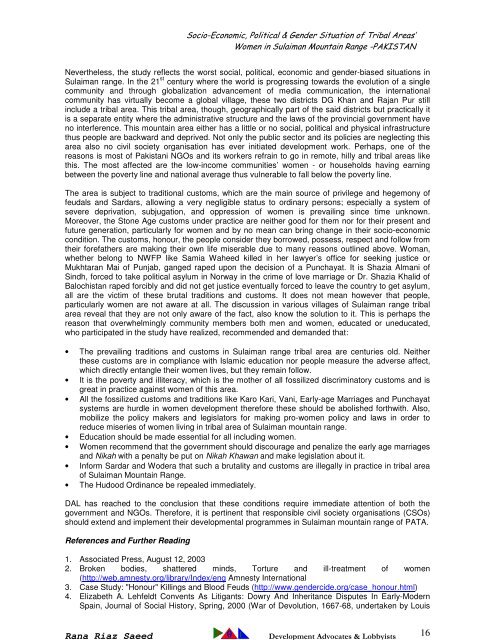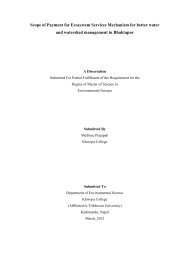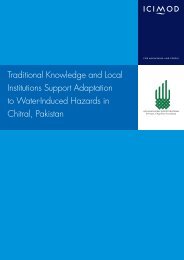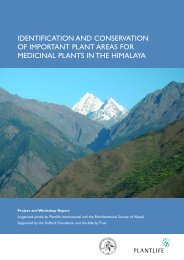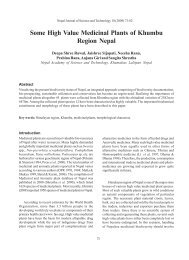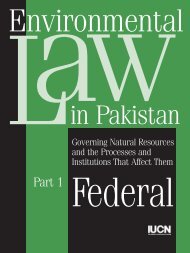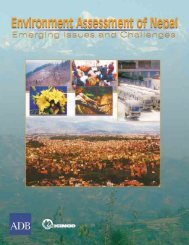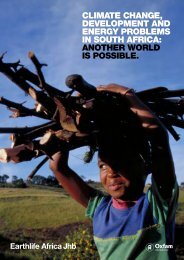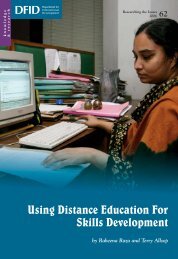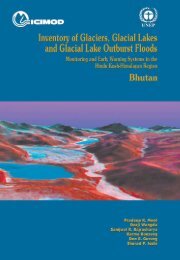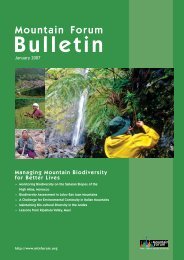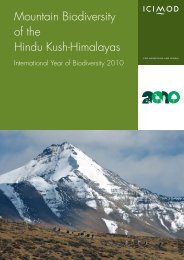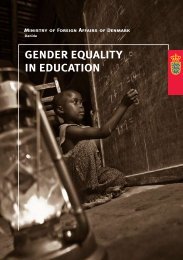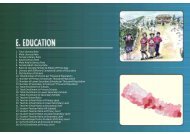Rana Riaz Saeed 1 - ResearchGate
Rana Riaz Saeed 1 - ResearchGate
Rana Riaz Saeed 1 - ResearchGate
Create successful ePaper yourself
Turn your PDF publications into a flip-book with our unique Google optimized e-Paper software.
Socio-Economic, Political & Gender Situation of Tribal Areas’<br />
Women in Sulaiman Mountain Range -PAKISTAN<br />
Nevertheless, the study reflects the worst social, political, economic and gender-biased situations in<br />
Sulaiman range. In the 21 st century where the world is progressing towards the evolution of a single<br />
community and through globalization advancement of media communication, the international<br />
community has virtually become a global village, these two districts DG Khan and Rajan Pur still<br />
include a tribal area. This tribal area, though, geographically part of the said districts but practically it<br />
is a separate entity where the administrative structure and the laws of the provincial government have<br />
no interference. This mountain area either has a little or no social, political and physical infrastructure<br />
thus people are backward and deprived. Not only the public sector and its policies are neglecting this<br />
area also no civil society organisation has ever initiated development work. Perhaps, one of the<br />
reasons is most of Pakistani NGOs and its workers refrain to go in remote, hilly and tribal areas like<br />
this. The most affected are the low-income communities’ women - or households having earning<br />
between the poverty line and national average thus vulnerable to fall below the poverty line.<br />
The area is subject to traditional customs, which are the main source of privilege and hegemony of<br />
feudals and Sardars, allowing a very negligible status to ordinary persons; especially a system of<br />
severe deprivation, subjugation, and oppression of women is prevailing since time unknown.<br />
Moreover, the Stone Age customs under practice are neither good for them nor for their present and<br />
future generation, particularly for women and by no mean can bring change in their socio-economic<br />
condition. The customs, honour, the people consider they borrowed, possess, respect and follow from<br />
their forefathers are making their own life miserable due to many reasons outlined above. Woman,<br />
whether belong to NWFP like Samia Waheed killed in her lawyer’s office for seeking justice or<br />
Mukhtaran Mai of Punjab, ganged raped upon the decision of a Punchayat. It is Shazia Almani of<br />
Sindh, forced to take political asylum in Norway in the crime of love marriage or Dr. Shazia Khalid of<br />
Balochistan raped forcibly and did not get justice eventually forced to leave the country to get asylum,<br />
all are the victim of these brutal traditions and customs. It does not mean however that people,<br />
particularly women are not aware at all. The discussion in various villages of Sulaiman range tribal<br />
area reveal that they are not only aware of the fact, also know the solution to it. This is perhaps the<br />
reason that overwhelmingly community members both men and women, educated or uneducated,<br />
who participated in the study have realized, recommended and demanded that:<br />
• The prevailing traditions and customs in Sulaiman range tribal area are centuries old. Neither<br />
these customs are in compliance with Islamic education nor people measure the adverse affect,<br />
which directly entangle their women lives, but they remain follow.<br />
• It is the poverty and illiteracy, which is the mother of all fossilized discriminatory customs and is<br />
great in practice against women of this area.<br />
• All the fossilized customs and traditions like Karo Kari, Vani, Early-age Marriages and Punchayat<br />
systems are hurdle in women development therefore these should be abolished forthwith. Also,<br />
mobilize the policy makers and legislators for making pro-women policy and laws in order to<br />
reduce miseries of women living in tribal area of Sulaiman mountain range.<br />
• Education should be made essential for all including women.<br />
• Women recommend that the government should discourage and penalize the early age marriages<br />
and Nikah with a penalty be put on Nikah Khawan and make legislation about it.<br />
• Inform Sardar and Wodera that such a brutality and customs are illegally in practice in tribal area<br />
of Sulaiman Mountain Range.<br />
• The Hudood Ordinance be repealed immediately.<br />
DAL has reached to the conclusion that these conditions require immediate attention of both the<br />
government and NGOs. Therefore, it is pertinent that responsible civil society organisations (CSOs)<br />
should extend and implement their developmental programmes in Sulaiman mountain range of PATA.<br />
References and Further Reading<br />
1. Associated Press, August 12, 2003<br />
2. Broken bodies, shattered minds, Torture and ill-treatment of women<br />
(http://web.amnesty.org/library/Index/eng Amnesty International<br />
3. Case Study: "Honour" Killings and Blood Feuds (http://www.gendercide.org/case_honour.html)<br />
4. Elizabeth A. Lehfeldt Convents As Litigants: Dowry And Inheritance Disputes In Early-Modern<br />
Spain, Journal of Social History, Spring, 2000 (War of Devolution, 1667-68, undertaken by Louis<br />
<strong>Rana</strong> <strong>Riaz</strong> <strong>Saeed</strong> Development Advocates & Lobbyists 16


